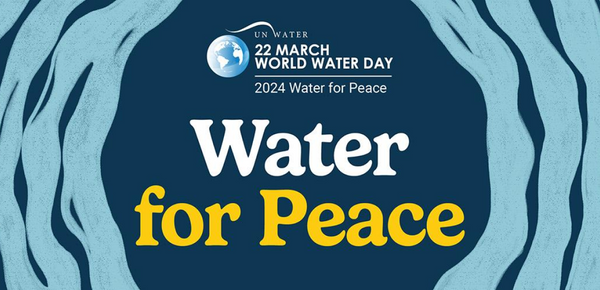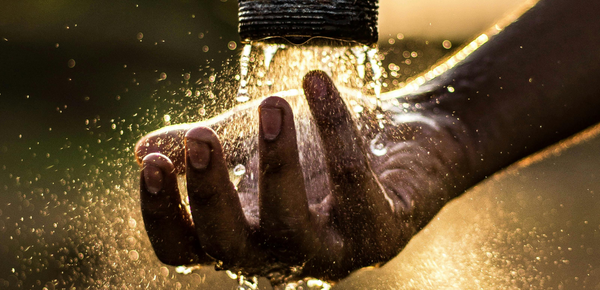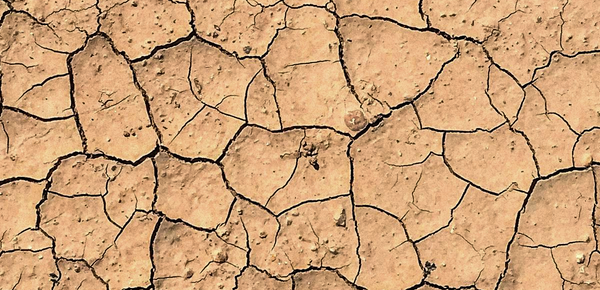We need to talk about water. It’s not just the stuff we drink - it shapes our world. It has the power to foster peace and harmony within communities worldwide – and wrench them apart. As we support the United Nations World Water Day 2024 in the U.S., it’s essential to recognize that clean water isn’t just a basic necessity, it’s a fundamental human right – and a crucial element in building sustainable and peaceful societies.
Here we look at how access to clean water positively impacts health and wellbeing, empowers people through educational opportunities and creates a sustainable future for the global community – and how you can take part to create that positive ripple effect.
What is World Water Day?
 Graphic from UN-Water
Graphic from UN-Water
Designated by the United Nations to underscore the significance of freshwater resources, World Water Day is observed internationally on March 22nd every year. The concept originated in 1992 during the United Nations Conference on Environment and Development in Rio de Janeiro, leading to the official establishment of World Water Day in 1993.
This global initiative serves to raise awareness about the 2.2 billion individuals worldwide who lack access to safe water, emphasizing the urgency of addressing the global water crisis. In fact, roughly half of the world’s population experiences severe water scarcity for at least part of the year. These numbers are expected to increase, exacerbated by climate change and population growth.
A primary objective of World Water Day is to advance the UN’s Sustainable Development Goal 6, which aims to ensure universal access to clean water and sanitation by 2030. This initiative strives to promote equitable access to safe water resources on a global scale.
This year’s theme revolves around Water for Peace. Because when we collaborate on water management, we initiate a beneficial ripple effect. This fosters harmony, promotes prosperity, and enhances resilience against common challenges.
What does Water for Peace mean?

With climate change and a growing global population, water lies at the heart of many global issues. And unfortunately, in many countries, not everyone has fair access to clean drinking water. Only 0.5% of water on Earth is usable and available freshwater – and climate change is dangerously affecting that supply. Over the past 20 years, terrestrial water storage – including soil moisture, snow and ice – has dropped at a rate of 1 cm per year, with major ramifications for water security.
The impact on food security, human health and well-being when access to clean water is non-existent or compromised is huge. Innocent people are affected: children under the age of 15 living in countries affected by protracted conflict are, on average, almost three times more likely to die from diarrhoeal diseases caused by a lack of safe water, sanitation and hygiene than by direct violence.
Water and Conflicts

Water-related conflicts arise due to scarcity or contamination issues and poor allocation to those who need it. The growing demand for water versus diminishing global supply gives rise to ongoing disputes. And the competition for access to fresh drinking water, water for irrigation and electricity production are just a few of the reasons for worsening conflict.
For example, in Europe, agriculture faces significant challenges due to water scarcity, prompting farmers to seek solutions. In France, one strategy involves filling megabasin reservoirs from aquifers during winter for use in the spring and summer growing seasons.
While this approach aims to alleviate strain on aquifers amid increasing summer droughts, critics argue that the water is accessible only to participating farmers. The controversy surrounding a megabasin project in Sainte-Soline, Deux-Sèvres, led to a confrontation between thousands of protesters and French police in October 2022, resulting in serious injuries on both sides.
In armed conflicts, water can be used as a weapon to drive military or political objectives. And let’s not forget, during conflicts, water infrastructure and resources can get damaged or destroyed. Attacking water systems is not only dangerous but also against the rules of war. It’s akin to attacking the lifeblood of a community.
How water can be a tool for peace

Very simply, water has the power to bring people together. Water cooperation across borders and sectors generates many benefits including enhancing food security, sustaining healthy livelihoods and ecosystems, helping to address resilience to climate change, contributing to disaster risk reduction, providing renewable energy, supporting cities and industry, and fostering regional integration and peace. And although there have been more instances of cooperation than conflict over water, there’s still plenty of room for improvement. When countries and communities peacefully work together on water issues, it sets a positive example for collaboration in other areas, too. Here’s why:
Clean water positively impacts health and wellbeing
The link between clean water and public health cannot be overstated. Access to clean water is directly correlated with improved health outcomes and overall well-being. In communities where clean water is scarce, waterborne diseases like cholera and typhoid are rampant, leading to illness, suffering, and even death. By providing access to clean water, we can significantly reduce the occurrence of these diseases and promote healthier, more productive communities.
It empowers people by opening up educational opportunities
Clean water also plays a vital role in improving educational outcomes and empowering individuals, particularly in developing regions. In areas where water is contaminated, children often miss school due to water-related illnesses, impacting their academic performance and future prospects. Additionally, access to clean water diminishes reliance on sugary or fizzy drinks, promoting better overall health and well-being among students.
Innovative technology creates sustainable water solutions
Innovative technologies and practices are key to achieving sustainable water solutions. Advancements in water purification, such as reverse osmosis, conservation, and distribution systems offer promising avenues for ensuring long-term access to clean water for communities worldwide. By harnessing these technologies, we can build more resilient and sustainable water infrastructure to meet the needs of future generations.
Create a positive ripple effect
You, your family and your workplace can play a significant role in promoting water for peace on World Water Day 2024 and beyond! Here are five ways to get involved:
- Raise awareness: spread the word about the importance of clean water and its role in promoting peace within communities and around the world. Share information on social media, host educational events in your community, or participate in local water-related activities.
- Conserve water: practice water-saving habits at home, such as fixing leaks, taking shorter showers, using water-efficient appliances and installing sustainable water filtration systems. Every drop saved contributes to the conservation of this precious resource.
- Support sustainable practices: choose products and services that prioritize sustainability and responsible water management, like planet-friendly bottleless water coolers. Look for eco-friendly brands, support local farmers who use sustainable irrigation methods, and reduce your water footprint wherever possible.
- Get involved in community initiatives: join local water conservation projects, river clean-up efforts, or advocacy campaigns aimed at improving water access and quality in your area. Working together with your community can make a big difference.
- Advocate for change: write to your elected representatives, participate in petitions, and support organizations working to address water-related issues on a larger scale. By raising your voice, you can help shape policies and initiatives that promote water security and peace globally.
Remember, even small actions can have a big impact when it comes to promoting water for peace. By working together and taking steps to conserve and protect water resources, we can all contribute to a more peaceful and sustainable world for future generations.
For more resources and information on World Water Day, visit www.un.org/en/observances/water-day. Let’s make every drop count in our journey toward a world where clean water is accessible to all.













































































